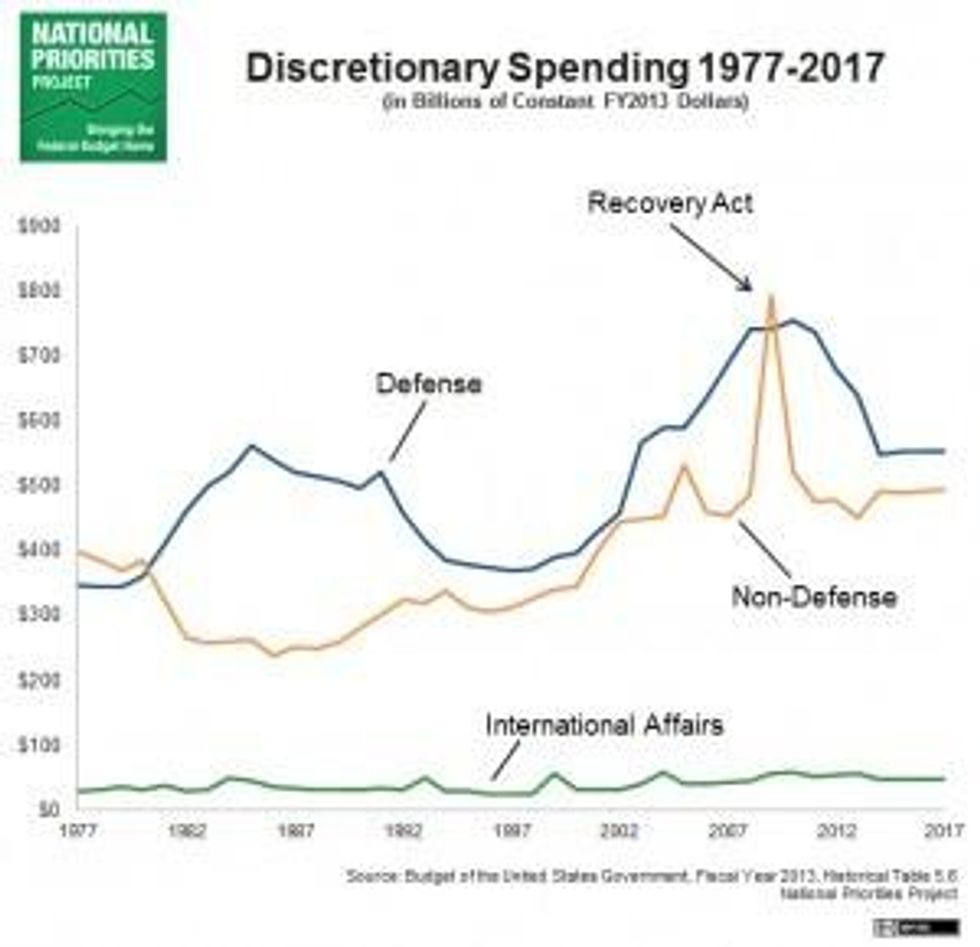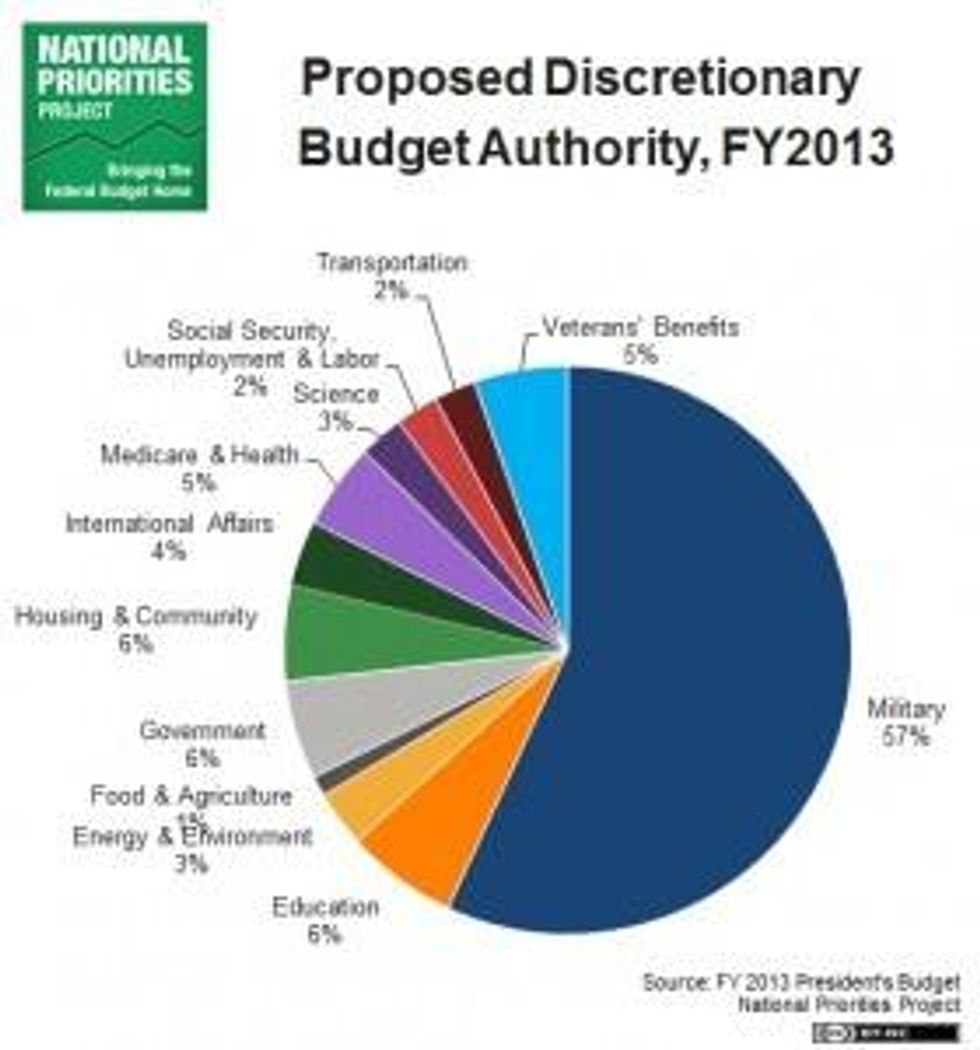

SUBSCRIBE TO OUR FREE NEWSLETTER
Daily news & progressive opinion—funded by the people, not the corporations—delivered straight to your inbox.
5
#000000
#FFFFFF
To donate by check, phone, or other method, see our More Ways to Give page.


Daily news & progressive opinion—funded by the people, not the corporations—delivered straight to your inbox.
Sequestration is both ugly and hard to explain. As a budget wonk, I like to use this metaphor:
It's as if the American people are being squeezed into the back of a dilapidated Chevy pickup. Careening down a dirt road, we're headed for a brick wall. Try as we might to wake up from this nightmare, we can't stop the truck.
That sounds frightening, and it is. Once sequestration kicks in, we'll feel the impact of approximately $85 billion in automatic, across-the-board federal cuts focused almost exclusively on discretionary spending.

Discretionary budget cuts aren't equal. As legislated, sequestration slashes more or less evenly from what's known as defense and non-defense discretionary spending. That sounds fair on the surface but consider that -- at 57 percent of all discretionary spending -- Pentagon-related federal expenditures have risen 35 percent since 2002, 48 percent when you include war costs. At the same time, non-military discretionary spending increased only eight percent, with notable reductions in funding for key social programs between 2010 and 2013.
Unlike the audit-dodging Pentagon, which has drawn bipartisan criticism for waste and bad management, there's no excess to trim. Sequester cuts to depleted social initiatives will mean less money flowing into state and local budgets, job loss, and the termination of services in sectors where there are already aching gaps between what's needed and what's offered. The needs won't evaporate. The costs will shift to cash-strapped state and local governments in the form of property tax hikes and budget overrides.
Consider the F-35 Joint Strike Fighter. While we've been splitting hairs over public dollars for food and roads, the F-35 has become the most costly weapons program in U.S. history due to setbacks and delays. The cost of just one of these jets (and 2,457 are on order this year) is nearly equal to the entire cut projected for Low Income Home Energy Assistance Program expected to take effect under sequestration.
Further, budgets are about revenue and spending. Many in Congress believe that the pot of money to be spent or saved is finite. It isn't. Yet, some members have an almost mythical resistance to raising revenue at a moment when affluent individuals and big corporations have the lowest tax burden in more than half a century.
Prior to January 1, the top 1 percent of income earners got a bigger annual income-tax break than the bottom 99 percent earned on average each year. Members of Congress grudgingly let most of that benefit sunset at the end of 2012. As a result, we'll see approximately $620 billion in additional revenue over the next decade.

We'd have a different national conversation right now if Congress would muster the political will to tackle tough questions like these.
The bottom line is that sequestration upends democracy. Americans deserve better than government by crisis. Through our taxes, we're the nation's major bill payers. Sequestration robs us -- and our lawmakers -- of our right and responsibility to make nuanced, thoughtful decisions about the fate of our nation. We need a federal budget by the people, for the people.
Dear Common Dreams reader, The U.S. is on a fast track to authoritarianism like nothing I've ever seen. Meanwhile, corporate news outlets are utterly capitulating to Trump, twisting their coverage to avoid drawing his ire while lining up to stuff cash in his pockets. That's why I believe that Common Dreams is doing the best and most consequential reporting that we've ever done. Our small but mighty team is a progressive reporting powerhouse, covering the news every day that the corporate media never will. Our mission has always been simple: To inform. To inspire. And to ignite change for the common good. Now here's the key piece that I want all our readers to understand: None of this would be possible without your financial support. That's not just some fundraising cliche. It's the absolute and literal truth. We don't accept corporate advertising and never will. We don't have a paywall because we don't think people should be blocked from critical news based on their ability to pay. Everything we do is funded by the donations of readers like you. Will you donate now to help power the nonprofit, independent reporting of Common Dreams? Thank you for being a vital member of our community. Together, we can keep independent journalism alive when it’s needed most. - Craig Brown, Co-founder |
Sequestration is both ugly and hard to explain. As a budget wonk, I like to use this metaphor:
It's as if the American people are being squeezed into the back of a dilapidated Chevy pickup. Careening down a dirt road, we're headed for a brick wall. Try as we might to wake up from this nightmare, we can't stop the truck.
That sounds frightening, and it is. Once sequestration kicks in, we'll feel the impact of approximately $85 billion in automatic, across-the-board federal cuts focused almost exclusively on discretionary spending.

Discretionary budget cuts aren't equal. As legislated, sequestration slashes more or less evenly from what's known as defense and non-defense discretionary spending. That sounds fair on the surface but consider that -- at 57 percent of all discretionary spending -- Pentagon-related federal expenditures have risen 35 percent since 2002, 48 percent when you include war costs. At the same time, non-military discretionary spending increased only eight percent, with notable reductions in funding for key social programs between 2010 and 2013.
Unlike the audit-dodging Pentagon, which has drawn bipartisan criticism for waste and bad management, there's no excess to trim. Sequester cuts to depleted social initiatives will mean less money flowing into state and local budgets, job loss, and the termination of services in sectors where there are already aching gaps between what's needed and what's offered. The needs won't evaporate. The costs will shift to cash-strapped state and local governments in the form of property tax hikes and budget overrides.
Consider the F-35 Joint Strike Fighter. While we've been splitting hairs over public dollars for food and roads, the F-35 has become the most costly weapons program in U.S. history due to setbacks and delays. The cost of just one of these jets (and 2,457 are on order this year) is nearly equal to the entire cut projected for Low Income Home Energy Assistance Program expected to take effect under sequestration.
Further, budgets are about revenue and spending. Many in Congress believe that the pot of money to be spent or saved is finite. It isn't. Yet, some members have an almost mythical resistance to raising revenue at a moment when affluent individuals and big corporations have the lowest tax burden in more than half a century.
Prior to January 1, the top 1 percent of income earners got a bigger annual income-tax break than the bottom 99 percent earned on average each year. Members of Congress grudgingly let most of that benefit sunset at the end of 2012. As a result, we'll see approximately $620 billion in additional revenue over the next decade.

We'd have a different national conversation right now if Congress would muster the political will to tackle tough questions like these.
The bottom line is that sequestration upends democracy. Americans deserve better than government by crisis. Through our taxes, we're the nation's major bill payers. Sequestration robs us -- and our lawmakers -- of our right and responsibility to make nuanced, thoughtful decisions about the fate of our nation. We need a federal budget by the people, for the people.
Sequestration is both ugly and hard to explain. As a budget wonk, I like to use this metaphor:
It's as if the American people are being squeezed into the back of a dilapidated Chevy pickup. Careening down a dirt road, we're headed for a brick wall. Try as we might to wake up from this nightmare, we can't stop the truck.
That sounds frightening, and it is. Once sequestration kicks in, we'll feel the impact of approximately $85 billion in automatic, across-the-board federal cuts focused almost exclusively on discretionary spending.

Discretionary budget cuts aren't equal. As legislated, sequestration slashes more or less evenly from what's known as defense and non-defense discretionary spending. That sounds fair on the surface but consider that -- at 57 percent of all discretionary spending -- Pentagon-related federal expenditures have risen 35 percent since 2002, 48 percent when you include war costs. At the same time, non-military discretionary spending increased only eight percent, with notable reductions in funding for key social programs between 2010 and 2013.
Unlike the audit-dodging Pentagon, which has drawn bipartisan criticism for waste and bad management, there's no excess to trim. Sequester cuts to depleted social initiatives will mean less money flowing into state and local budgets, job loss, and the termination of services in sectors where there are already aching gaps between what's needed and what's offered. The needs won't evaporate. The costs will shift to cash-strapped state and local governments in the form of property tax hikes and budget overrides.
Consider the F-35 Joint Strike Fighter. While we've been splitting hairs over public dollars for food and roads, the F-35 has become the most costly weapons program in U.S. history due to setbacks and delays. The cost of just one of these jets (and 2,457 are on order this year) is nearly equal to the entire cut projected for Low Income Home Energy Assistance Program expected to take effect under sequestration.
Further, budgets are about revenue and spending. Many in Congress believe that the pot of money to be spent or saved is finite. It isn't. Yet, some members have an almost mythical resistance to raising revenue at a moment when affluent individuals and big corporations have the lowest tax burden in more than half a century.
Prior to January 1, the top 1 percent of income earners got a bigger annual income-tax break than the bottom 99 percent earned on average each year. Members of Congress grudgingly let most of that benefit sunset at the end of 2012. As a result, we'll see approximately $620 billion in additional revenue over the next decade.

We'd have a different national conversation right now if Congress would muster the political will to tackle tough questions like these.
The bottom line is that sequestration upends democracy. Americans deserve better than government by crisis. Through our taxes, we're the nation's major bill payers. Sequestration robs us -- and our lawmakers -- of our right and responsibility to make nuanced, thoughtful decisions about the fate of our nation. We need a federal budget by the people, for the people.